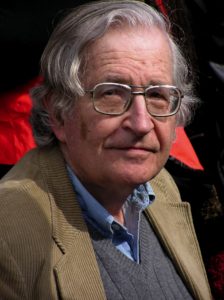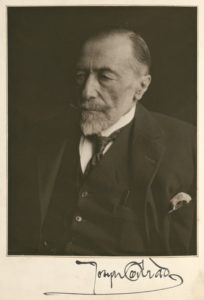
Noam Chomsky

Graciela Chichilinsky
truth-out.org. September 2016. How serious of an issue is climate change? Does global warming really threaten human civilization? Can it be reversed, or is it already late?
In this interview for Truthout, two scholars, Noam Chomsky, one of the world’s leading public intellectuals, and Graciela Chichilnisky, a renowned economist and climate change authority who wrote and designed the carbon market of the Kyoto Protocol, concur on a few key points. First of all, global warming and climate change constitute the greatest challenge facing humanity, and may pose an even greater threat to our species than that of nuclear weapons. Secondly, the operations of the capitalist world economy are at the core of the climate change threat because of over-reliance on fossil fuels and a perverse sense of economic values. Thirdly, the world needs to adopt alternative energy systems as quickly as possible. And finally, it is crucial to explore technologies to assist us in reversing climate change — as time is running out.
C. J. Polychroniou: A consensus seems to be emerging among scientists and even political and social analysts that global warming and climate change represent the greatest threat to the planet. Do you concur with this view, and why?
Noam Chomsky: I agree with the conclusion of the experts who set the Doomsday Clock for the Bulletin of Atomic Scientists. They have moved the Clock two minutes closer to midnight — three minutes to midnight — because of the increasing threats of nuclear war and global warming. That seems to me a credible judgment. Review of the record shows that it’s a near miracle that we have survived the nuclear age. There have been repeated cases when nuclear war came ominously close, often a result of malfunctioning of early-warning systems and other accidents, sometimes [as a result of] highly adventurist acts of political leaders. It has been known for some time that a major nuclear war might lead to nuclear winter that would destroy the attacker as well as the target. And threats are now mounting, particularly at the Russian border, confirming the prediction of George Kennan and other prominent figures that NATO expansion, particularly the way it was undertaken, would prove to be a “tragic mistake,” a “policy error of historic proportions.”
As for climate change, it’s by now widely accepted by the scientific community that we have entered a new geological era, the Anthropocene, in which the Earth’s climate is being radically modified by human action, creating a very different planet, one that may not be able to sustain organized human life in anything like a form we would want to tolerate. There is good reason to believe that we have already entered the Sixth Extinction, a period of destruction of species on a massive scale, comparable to the Fifth Extinction 65 million years ago, when three-quarters of the species on earth were destroyed, apparently by a huge asteroid. Atmospheric CO2 is rising at a rate unprecedented in the geological record since 55 million years ago. There is concern — to quote a statement by 150 distinguished scientists — that “global warming, amplified by feedbacks from polar ice melt, methane release from permafrost, and extensive fires, may become irreversible,” with catastrophic consequences for life on Earth, humans included — and not in the distant future. Sea level rise and destruction of water resources as glaciers melt alone may have horrendous human consequences.
Graciela Chichilnisky: The consensus is that climate change ranks along with nuclear warfare as the top two risks facing human civilization. If nuclear warfare is believed to be somewhat controlled, then climate change is now the greatest threat.
As difficult as it is to eliminate the risk of nuclear warfare, it requires fewer changes to the global economy than does averting or reversing climate change. Climate change is due to the use of energy for industrial growth, which has been and is overwhelmingly based on fossil fuels. Changing an economic system that is bent on uncontrolled and poorly measured economic growth and depends on fossil energy for its main objectives, is much more difficult than changing how nuclear energy is used for military purposes. Some think it may be impossible.
Virtually all scientific studies point to increased temperatures since 1975, and a recent story in The New York Times confirms that decades-long warnings by scientists on global warming are no longer theoretical as land ice melts and sea levels rise. Yet, there are still people out there who not only question the widely accepted scientific view that current climate change is mostly caused by human activities, but also cast a doubt on the reliability of surface temperatures. Do you think this is all politically driven, or also caused by ignorance and perhaps even fear of change?
Chomsky: It is an astonishing fact about the current era that in the most powerful country in world history, with a high level of education and privilege, one of the two political parties virtually denies the well-established facts about anthropogenic climate change. In the primary debates for the 2016 election, every single Republican candidate was a climate change denier, with one exception, John Kasich — the “rational moderate” — who said it may be happening but we shouldn’t do anything about it. For a long time, the media have downplayed the issue. The euphoric reports on US fossil fuel production, energy independence, and so on, rarely even mention the fact that these triumphs accelerate the race to disaster. There are other factors too, but under these circumstances, it hardly seems surprising that a considerable part of the population either joins the deniers or regards the problem as not very significant.
Chichilnisky: Climate change is new and complex. We don’t have all the answers. We are still learning how exactly the Earth reacts to increased CO2 and other greenhouse gases. We know it leads to warming seas which are melting the North and the South Poles, rising and starting to swallow entire coastal areas in the US and elsewhere, as the New York Times article documents. We know that the warming rising seas will swallow entire island nations that are about 25 percent of the UN vote and perhaps at the end, even our civilization. This realization is traumatic and the first reaction to trauma is denial. Since there is some remaining scientific uncertainty, a natural response is to deny that change is occurring. This is natural but it is very dangerous. Signs of a poorly understood but treatable house fire requires action, not inaction. While denial leads to certainty, it is only the certainty of death. This is true for individuals and also for civilizations.
Political parties often take advantage of denial and fear in a moment of change. This is a well understood phenomenon that often leads to scapegoat-ism: blaming outsiders, such as immigrants, or racial and religious minorities. The phenomenon is behind Brexit and the violence in the political cycles in the US and EU. After denial comes anger and finally, acceptance. I think some are still between denial and anger, and I hope will reach acceptance, because there is still time to act, but the door is closing fast.
In global surveys, Americans are more skeptical than other people around the world over climate change. Why is that? And what does it tell us about American political culture?
Chomsky: The US is to an unusual extent a business-run society, where short-term concerns of profit and market share displace rational planning. The US is also unusual in the enormous scale of religious fundamentalism. The impact on understanding of the world is extraordinary. In national polls almost half of those surveyed have reported that they believe that God created humans in their present form 10,000 years ago (or less) and that man shares no common ancestor with the ape. There are similar beliefs about the Second Coming. Senator James Inhofe, who headed the Senate Committee on the environment, speaks for many when he assures us that “God’s still up there and there’s a reason for this to happen,” so it is sacrilegious for mere humans to interfere.
Chichilnisky: The “can do” logic, by its own nature, does not accept limits. And an empire does not have a graceful way to evolve out of this role. History demonstrates this time and again. Trying to conserve a privileged global position makes change traumatic for the US.
The first reaction to trauma is denial, as I explained, then comes anger and finally, acceptance. I think the US is still between denial and anger, and I hope we will reach acceptance because almost perversely, right now, only the US has the technology that is needed for global economic change.
Recent data related to global emissions of heat-treating gases suggest that we may have left behind us the period of constantly increased emissions. Is there room here for optimism about the future of the environment?
Chomsky: There is always room for Gramsci’s “optimism of the will.” There are still many options, but they are diminishing. Options range from simple initiatives that are easily undertaken like weatherizing homes (which could also create many jobs), to entirely new forms of energy, perhaps fusion, perhaps new means of exploiting solar energy outside the Earth’s atmosphere (which has been seriously suggested), to methods of decarbonization that might, conceivably, even reverse some of the enormous damage already inflicted on the planet. And much else.
Chichilnisky: This is good news, it is a step in the right direction. But the road is miles long and the first step, while necessary, does not determine success. It is far from enough. The problem that few people appreciate and was only recently observed in the IPCC [Intergovernmental Panel on Climate Change] data is that CO2 stays hundreds of years in the atmosphere once emitted. It does not decay as particles or sulfur dioxide does. We have used the majority of our carbon budget and we are already at dangerous levels of CO2 concentrations, about 400 parts per million. The levels were 250 before industrialization. So the problem is what we have done already and, therefore, what must be undone.
According to the Fifth Assessment Report of the IPCC, page 191, in most scenarios we now have to remove the CO2 we emitted. These emissions were recent, mostly since World War II — 1945 — which was a turning point of the world economy. This was the era of US dominance and of globalization based on over-extraction of natural resources from poor nations and overconsumption of those same resources by the rich industrial nations. The era of galloping increase of wealth by the very few and the even faster galloping and record inequality and poverty in the world economy as a whole. This is the divide between the [global] North that houses 18 percent of the global population and the [global] South that houses over 80 percent.
Given that change in human behavior happens slowly and that it will take many decades before the world economy makes a shift to new, clean(er) forms of energy, should we look toward a technological solution to climate change?
Chomsky: Anything feasible and potentially effective should be explored. There is little doubt that a significant part of any serious solution will require advances of technology, but that can only be part of the solution. Other major changes are necessary. Industrial production of meat makes a huge contribution to global warming. The entire socioeconomic system is based on production for profit and a growth imperative that cannot be sustained.
There are also fundamental issues of value: What is a decent life? Should the master-servant relation be tolerated? Should one’s goals really be maximization of commodities — Veblen’s “conspicuous consumption”? Surely there are higher and more fulfilling aspirations.
Chichilnisky: We seem to have no alternative. I would like to say that the problem could be solved by green energy sources. However, they can no longer solve the problem: many studies have demonstrated that the long-run solutions, such as planting more trees, which are critical to human survival, and adopting cleaner forms of energy, which are the long-run energy solution, cannot be utilized in the timescale that matters. That is the problem. Technology is a many-headed monster and perhaps it would be better to regress to a safer past and avoid technological change; it is tempting to think like that. But UN studies have shown that even if we planted a tree on every square yard available in the planet by the end of the century we would only capture at most 10 percent of the CO2 we need to reduce. This does not mean that we should not plant trees; we should, for biodiversity’s sake, and for our long-term future together with the other species.
Trees and clean energy [are] the long-run solution but we have no time to wait for the long run. We need a short-run solution now, and one that encourages and facilitates the transition to the long-run solution. This is the technology that IPCC proposes, to remove CO2 directly from air. I cofounded a company called Global Thermostat that uses the heat and the power from clean and fossil energy sources, such as solar plants and wind farms, to remove CO2 from air. It provides a short-run solution that facilitates and accelerates the advent of the needed long run.
Many in the progressive and radical community, including the Union of Concerned Scientists (UCS), are quite skeptical and even opposed to so-called “geo-engineering” solutions. Is this the flip side of the coin to climate change deniers?
Chomsky: That does not seem to me a fair assessment. UCS and others like them may be right or wrong, but they offer serious reasons. That is also true of the very small group of serious scientists who question the overwhelming consensus, but the mass climate denier movements — like the leadership of the Republican Party and those they represent — are a different phenomenon altogether. As for geoengineering, there have been serious general critiques that I think cannot be ignored, like Clive Hamilton’s, along with many positive assessments. It is not a matter for subjective judgment based on guesswork and intuition. Rather, these are matters that have to be considered seriously, relying on the best scientific understanding available, without abandoning sensible precautionary principles.
Chichilnisky: The remedy could be worse than the disease. Certain geoengineering processes have been proposed that could be very dangerous and must be avoided. Geoengineering means changing the Earth’s fundamental large-scale processes. We know little of the consequences of the geoengineering process, such as spraying particles into the atmosphere that shade the planet from the sun’s rays and could decrease its temperature. But this process is how dinosaurs disappeared from the Earth about 60 million years ago, by particles spewed by a volcano or a giant meteorite impact, and our species could follow suit. The sun is the source of all energy on planet Earth and we cannot experiment with our only energy source. Changing the world’s oceans to increase their uptake of CO2, as other geoengineering solutions propose, is equally dangerous, as the increased resulting acidity of the oceans kills tiny crustaceans, such as krill, that are the basis of the pyramid of life on the planet as we know it.
What immediate but realistic and enforceable actions could or should be taken to tackle the climate change threat?
Chomsky: Rapid ending of use of fossil fuels, sharp increase in renewable energy, research into new options for sustainable energy, significant steps toward conservation, and not least, a far-reaching critique of the capitalist model of human and resource exploitation; even apart from its ignoring of externalities, the latter is a virtual death knell for the species.
Chichilnisky: Here is a plan consisting of realistic and enforceable actions that can be taken now to tackle the climate change threat: We have to remove the CO2 that the industrial economy has already emitted, which otherwise will remain in the atmosphere for hundreds of years and alter the Earth’s climate irreversibly. It is possible to do this. The technology now exists to remove carbon directly from the atmosphere and is proven, very safe and inexpensive. This new technology works by taking the CO2 directly from pure air — or a combination of industrial sources and pure air — using as a power source not electricity, but mostly the inexpensive heat that is residual of most industrial processes. The CO2 removed from air is stabilized on earth by selling it for useful commercial purposes with a benefit. CO2 from air can replace petroleum: it can produce plastics and acetate, it can produce carbon fibers that replace metals and clean hydrocarbons, such as synthetic gasoline. We can use CO2 to desalinate water, enhance the production of vegetables and fruit in greenhouses, carbonate our beverages and produce biofertilizers that enhance the productivity of the soil without poisoning it. Carbon negative technology is absolutely needed now as reported by the UNFCCC [United Nations Framework Convention on Climate Change] Fifth Assessment Report of the IPCC, p. 191, and also in four articles of the 2015 Paris Agreement.
Is there a way to predict how the world will look like 50 years from now if humans fail to tackle and reverse global warming and climate change?
Chomsky: If current tendencies persist, the outcome will be disastrous before too long. Large parts of the world will become barely habitable affecting hundreds of millions of people, along with other disasters that we can barely contemplate.
Chichilnisky: It is easier to create the future than to predict it. Right now we must implement the requirements of the UN Intergovernmental Panel on Climate Change and the UN Kyoto Protocol, as well as the Paris Agreement recommendations: immediately we must remove the CO2 we have already emitted from the planet’s atmosphere and extend the Kyoto emission limits. This is the only possible alternative in most scenarios to catastrophic climate change. This can and must be done.
The funding provided by the Kyoto Protocol Carbon Market could build carbon negative power plants in poor nations. Carbon negative power plants can provide energy while they overcome poverty and change economic values in the right direction.
The UN carbon market, which is international law since 2005, will produce a much needed change in global economic values. The change in economic values created by the new markets for global public goods will reorient our global economy and under the right conditions can usher the satisfaction of basic needs of the present and of the future. This is what is needed right now. We need to support our future instead of undermining human survival. Let’s do it.
About the author:
C.J. Polychroniou is a political economist/political scientist who has taught and worked in universities and research centers in Europe and the United States. His main research interests are in European economic integration, globalization, the political economy of the United States and the deconstruction of neoliberalism’s politico-economic project. He is a regular contributor to Truthout as well as a member of Truthout’s Public Intellectual Project. He has published several books and his articles have appeared in a variety of journals, magazines, newspapers and popular news websites. Many of his publications have been translated into several foreign languages, including Croatian, French, Greek, Italian, Portuguese, Spanish and Turkish.
Originally published on http://www.truth-out.org/
Copyright, Truthout. May not be reprinted without permission.





